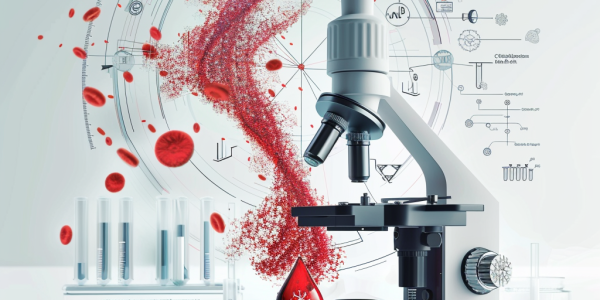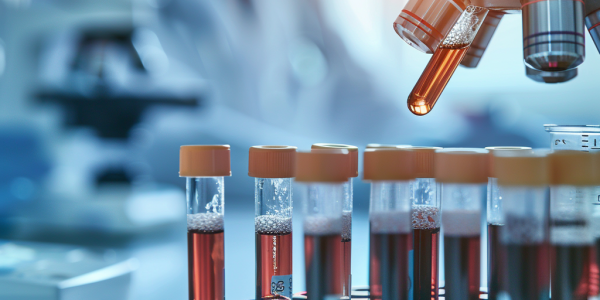MSU Researchers Develop Breakthrough Method for Early Disease Detection via Blood Proteins
Michigan State University researchers have achieved a breakthrough in early disease detection by analyzing blood proteins. Their innovative method, developed alongside the Karolinska Institute and UC Berkeley, enhances patient outcomes through earlier diagnosis and tailored treatment plans. Published in Nature Communications, this research focuses on identifying critical biomarkers in blood plasma, potentially transforming medical diagnostics and improving healthcare strategies.
New Blood Test Detects Early Lung Damage in Cancer Patients on Targeted Therapy
A revolutionary blood test developed by researchers at Hadassah Medical Center detects early lung damage in cancer patients receiving antibody-drug conjugates (ADCs). This non-invasive method offers a timely alternative to traditional imaging, improving patient outcomes and safety by allowing for early intervention in cases of interstitial lung disease (ILD).
Breakthrough Study Reveals Blood Proteins Can Predict Over 60 Diseases
Recent medical research reveals that a drop of blood can predict over 60 diseases using protein signatures. A collaborative study published in Nature Medicine highlights how analyzing plasma proteins can enhance early disease detection and personalized medicine, paving the way for improved healthcare outcomes.
FDA Approves Groundbreaking Blood Test for Colorectal Cancer Screening
The FDA’s recent approval of the Shield blood test by Guardant Health marks a significant advancement in colorectal cancer screening. Designed to detect cancerous DNA in the bloodstream, this test aims to increase screening rates, especially among younger adults. With an 83% effectiveness in identifying colorectal cancers, the Shield test is expected to enhance early detection, potentially saving lives and reducing healthcare burdens. As insurance coverage becomes more accessible, the hope is that more individuals will participate in routine screenings.
Revolutionary Blood Test Achieves 90% Accuracy in Alzheimer’s Diagnosis
Recent research reveals a groundbreaking blood test for Alzheimer’s disease with a 90% accuracy rate in early detection. Utilizing the plasma phosphorylated tau 217 (p-tau217) biomarker, this test significantly outperforms traditional diagnostic methods. Experts believe this advancement could transform Alzheimer’s diagnosis and lead to earlier interventions, improving outcomes for patients and families.
Revolutionary Blood Test Predicts Breast Cancer Recurrence with 100% Accuracy
Learn about the groundbreaking new blood test that can predict breast cancer recurrence with 100% accuracy, offering hope for early detection and treatment. Stay informed on the latest healthcare advancements to protect yourself and your loved ones from the risks of breast cancer.
New Blood Test Could Detect Parkinson’s Disease Years Before Symptoms Show
Groundbreaking blood test developed by researchers from University College London and University Medical Center Goettingen could detect Parkinson’s disease up to seven years before symptoms appear. Through machine learning analysis, researchers identified specific biomarkers in blood samples of patients with rapid eye movement behavior disorder (iRBD) linked to Parkinson’s. Early detection may revolutionize treatment, allowing for interventions to slow disease progression. This innovative approach offers a less invasive alternative to lumbar puncture for diagnosis and potential targets for new drug therapies.
New Blood Test Revolutionizes Detection of Fatal Heart Condition in Children
Recent advancements in technology have led to a groundbreaking development in preventing sudden cardiac deaths in children. A new blood test can now identify Hypertrophic Cardiomyopathy and assess the risk of fatality, offering a more accessible and potentially life-saving diagnostic tool. This innovation marks a significant step forward in pediatric healthcare, allowing healthcare professionals to proactively manage cardiac conditions in children and safeguard their well-being.
Groundbreaking Blood Test Predicts Breast Cancer Recurrence Years in Advance
Groundbreaking new blood test hailed as major breakthrough in fight against breast cancer, predicting risk of cancer returning 3 years before traditional scans. ‘Incredibly exciting’ liquid biopsy could significantly improve chances of overcoming disease. Research showcases effectiveness of personalized test in detecting cancer DNA in blood, identifying patients at risk of relapse up to 41 months in advance. Experts optimistic about proactive approach to treatment based on predictive capabilities.
Study Identifies Potential Marker for Delayed Recovery of Concussion in Children
A recent study has identified a potential marker for delayed recovery of concussion in children, offering hope for improved diagnosis and treatment. The blood protein alpha-1-antichymotrypsin (alpha-1-ACT) was found to be significantly lower in children with delayed recovery, providing a potential tool for early identification of at-risk children. The study’s publication in the Journal of Neurotrauma underscores the significance of these findings and their potential impact on pediatric concussion management.










